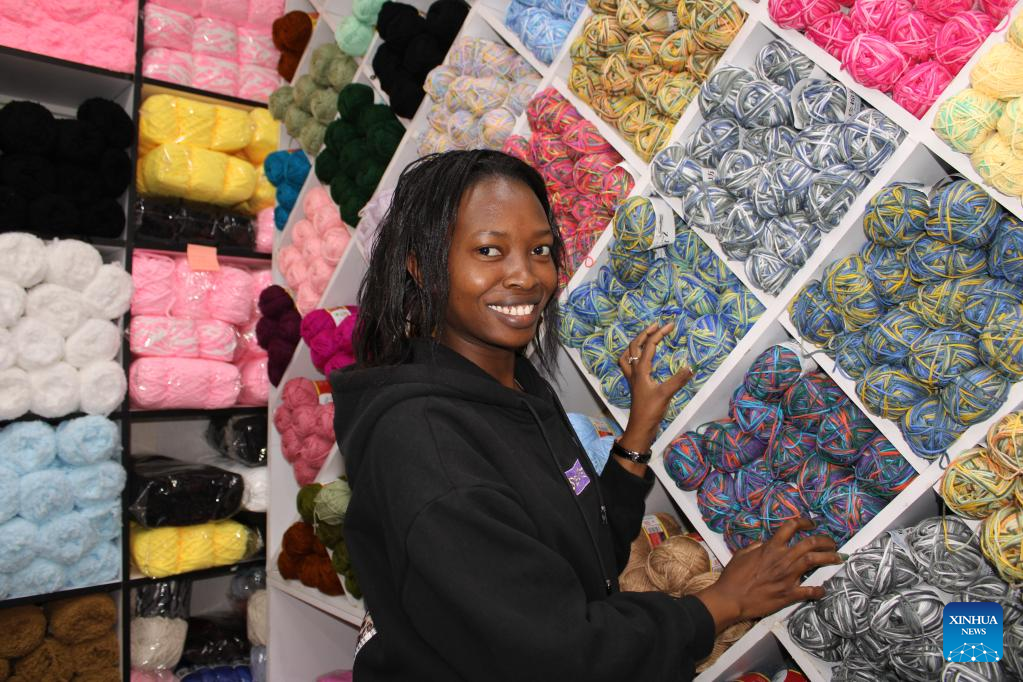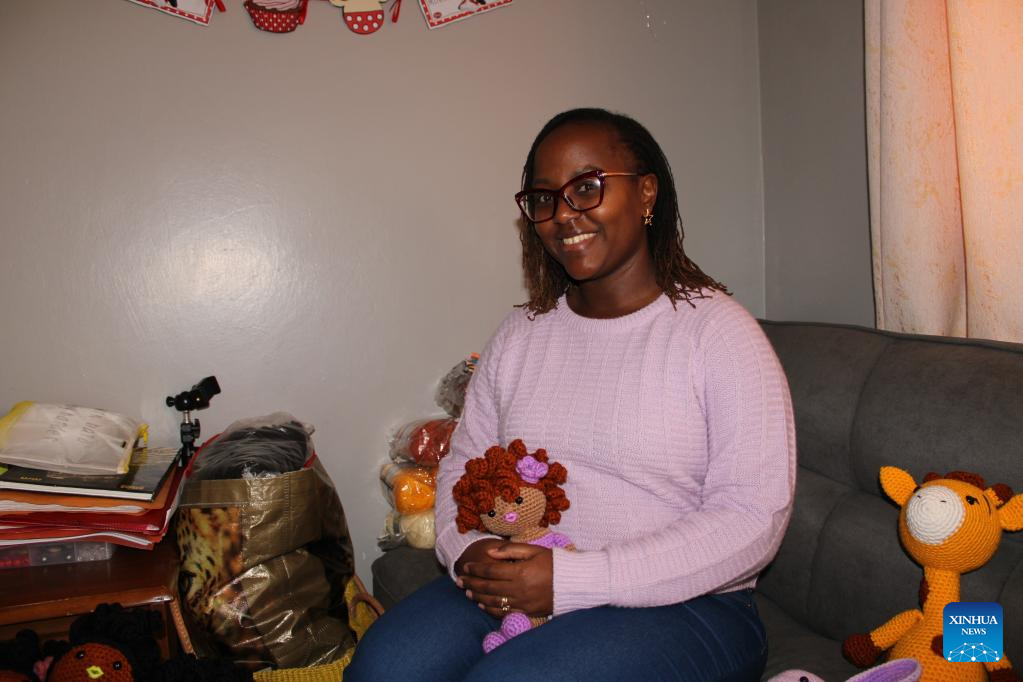
An employee poses for photos next to a display of yarns at a yarn shop in downtown Nairobi, Kenya's capital, Aug. 25, 2022. In Kenya, crocheting and knitting are typical needlework undertakings usually done listlessly by women to create dainty doilies and cheap household items such as beanies and baby shawls. However, this century-old practice appears to be staging a comeback with newer spunkier designs.(Photo by Chrispinus Omar/Xinhua)
by Xinhua writer Chrispinus Omar
NAIROBI, Sept. 2 (Xinhua) -- Njeri Muigai, a student, walks into a yarn shop in downtown Nairobi, Kenya's capital, and embarks on a random survey before making her purchase.
She buys a ball of T-shirt yarn and venerated yarn, a cocktail for her upcoming crocheting project. Most of its yarns, favored by local knitters, are imported from China and Turkey.
"The options available are vast and so beautiful, you can get as many colors as you want which makes this hobby even more enjoyable," she said during a recent interview with Xinhua in Nairobi.
Muigai, who grew up watching her mother crochet, has been knitting for a little over two years now. "She seemed to be using the same colors and yarn fibers. There is so much at my disposal right now," she added.
The shop owned by Joan Bwires deals with the retail of yarn and yarn-related accessories based in downtown Nairobi. Bwire set up the shop in 2021 after establishing that local manufacturers only produced one type of yarn fabric and had limited offerings of colors.
Bwire saw a need in the market because what was available was only acrylic yarn. Then she started importing from China and Turkey.
"My yarns range from 140 to 1,300 shillings (1.16-10.82 U.S. dollars) with the most expensive yarn being the T-shirt yarn. The market regains vitality now," she added.
In Kenya, crocheting and knitting are typical needlework undertakings usually done listlessly by women to create dainty doilies and cheap household items such as beanies and baby shawls.
However, this century-old practice appears to be staging a comeback with newer spunkier designs. It is no longer a preserve of the old women as the younger generation takes on the art boldly, employing new designs and techniques.
An observation of the local scene reveals that crocheting takes place in small-scale operations, namely in small workshops and homes. Conversely, knitting occurs on an industrial scale, particularly in the production of ready-to-wear apparel such as school uniforms. Archival local records note the art of needlework has been in existence for centuries without providing a distinct date or origin.
Modern times have precipitated an influx of online instructional material on knitting and crocheting, alongside the emergence of simple machines to make the art more mechanical. In the past, the art was limited to a generational apprenticeship.
With practiced ease, Felister Nduta wounds a crochet hook through a web of yarn, picking up strands and locking them, creating striking designs through the exercise. Nduta is a self-taught yarn crochet artist specializing in the creation of garments using yarns.
It is an art she has been executing with brilliant mastery since 2017. "I started crocheting while in college after seeing a beautiful top on Instagram. Crocheting seemed like a business that could earn me some cash while in school. I watched a few videos and that is how I began," said Nduta, a procurement officer.
At present, Nduta, 25, runs an online enterprise that deals with women's outfits such as dresses, skirts, and shorts modeled from yarn fabrics. Her crocheting exploits supplement her primary source of income.
"The proceeds from my crocheting business go into settling my rent. I think if I did this full-time the money it generated would be enough to sustain me. I am still working on archiving that," she explained.
In 2017, Nyawira Mafabi thrust her focus into crocheting dolls using yarn, establishing her enterprise Nyuzzii creations. Under her brand, she churns out ready-made and bespoke African-themed dolls and animal stuffing.
"My idea was to create African dolls because the market was full of white dolls and also increase the representation of religion hence my hijab doll which is available on order," said Mafabi.
Mafabi says that the initial cost of setting up her trade was surmountable noting that she had no overheads such as rent, electricity, or transport to cover.
Her seed capital went into the purchase of yarn which cost below one dollar at the time of starting. "I make enough to have this trade as my main source of income," said Mafabi, believing that the Kenyan style of knitting has great potential in the global market.
Mafabi confers that the future is yarn and that the timeless craft can only grow bigger and attract more artists, consequently evolving into a booming enterprise. ■

Nyawira Mafabi, a local entrepreneur, poses for photos with her African-themed dolls at her home in Nairobi, Kenya, Aug. 25, 2022. In Kenya, crocheting and knitting are typical needlework undertakings usually done listlessly by women to create dainty doilies and cheap household items such as beanies and baby shawls. However, this century-old practice appears to be staging a comeback with newer spunkier designs.(Photo by Chrispinus Omar/Xinhua)

Felister Nduta (L), a self-taught yarn crochet artist, poses next to a model wearing her yarn crocheted apparel in Nairobi, Kenya, Aug. 25, 2022. In Kenya, crocheting and knitting are typical needlework undertakings usually done listlessly by women to create dainty doilies and cheap household items such as beanies and baby shawls. However, this century-old practice appears to be staging a comeback with newer spunkier designs.(Photo by Chrispinus Omar/Xinhua)
